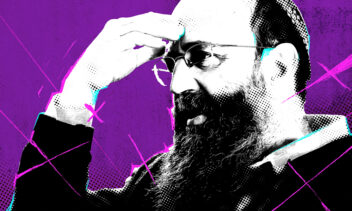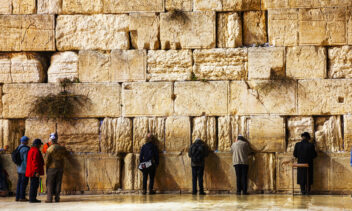Where does one go to find God?
At different times of our lives, this question has different implications. For some of us, this question drives our clicking, praying, running, and healing, as we seek the elusive face behind it all. For others, the question itself is reminiscent of an earlier time of life–perhaps a more idealistic time, a time when philosophical questions and journeys mattered above all else, a time when everything was still possible, up in the air. For others, this question has always mattered less than a different question: How does one serve God? Through what path, approach, set of rules or rhymes or songs? In a more local idiom: Where is God, and where is the Torah?
One fascinating Midrash (Shemot Rabbah 5:9) portrays the Jews at Sinai seeking God, and the complications that beset them upon this journey:
כְּשֶׁנָּתַן הַקָּדוֹשׁ בָּרוּךְ הוּא אֶת הַתּוֹרָה בְּסִינַי הֶרְאָה בְּקוֹלוֹ לְיִשְׂרָאֵל פִּלְאֵי פְּלָאִים, כֵּיצַד הָיָה הַקָּדוֹשׁ בָּרוּךְ הוּא מְדַבֵּר וְהַקּוֹל יוֹצֵא וּמַחֲזִיר בְּכָל הָעוֹלָם, יִשְׂרָאֵל שׁוֹמְעִין אֶת הַקּוֹל בָּא עֲלֵיהֶם מִן הַדָּרוֹם וְהָיוּ רָצִים לַדָּרוֹם לְקַבֵּל אֶת הַקּוֹל, וּמִדָּרוֹם נֶהְפַּךְ לָהֶם לְצָפוֹן וְהָיוּ רָצִים לַצָּפוֹן, וּמִצָּפוֹן נֶהְפַּךְ לְמִזְרָח וְהָיוּ רָצִים לַמִּזְרָח, וּמִמִּזְרָח נֶהְפַּךְ לָהֶם לְמַעֲרָב וְהָיוּ רָצִים לַמַּעֲרָב, וּמִן הַמַּעֲרָב נֶהְפַּךְ לָהֶם מִן הַשָּׁמַיִם וְהָיוּ תּוֹלִין עֵינֵיהֶן וְהָיָה נֶהְפַּךְ בָּאָרֶץ, וְהָיוּ מַבִּיטִין לָאָרֶץ, שֶׁנֶּאֱמַר (דברים ד, לו): מִן הַשָּׁמַיִם הִשְׁמִיעֲךָ אֶת קֹלוֹ לְיַסְּרֶךָּ. וְהָיוּ יִשְׂרָאֵל אוֹמְרִים זֶה לָזֶה (איוב כח, יב): וְהַחָכְמָה מֵאַיִן תִּמָּצֵא
When God gave the Torah at Sinai, He showed His voice to Israel through wondrous wonders. God would speak and His voice would go forth and reverberate to and fro throughout the whole world. Israel would hear the voice coming from the south and they would run to the South to receive the voice. When they would reach the south, it would then come to them from the North, and so they would run to the North to receive the voice, and from there it would come to them from the East, and then from the West, each time changing as they arrived. From the West, it then came from the heaven, and when Israel raised their eyes upwards it then came from the ground … The Jews to turn to each other and ask “And wisdom, from whence does it come?!”
On the simplest level, this Midrash teaches a simple truth: the road to revelation, to wisdom, and to God, are rarely simple or straightforward. Often the road to the voice we hope to hear takes us far and wide, ending only in a desperate hope, when we wonder, demand: where does wisdom come from and where can it be found? This powerful Midrashic fragment portrays a Jewish people desperate for the voice of God, chasing the voice with an almost absurd devotion, as the voice runs away from them.
Tremendous advancements in science and technology have changed the face of life as we live it, shifting the very tectonic plates of the human consciousness.
One can read this Midrash as a critique on those that chase the voice of God, which ultimately comes neither from any one direction or locality, but from the search itself: only from the impassioned plea of “where does wisdom come from?” might wisdom come from. Perhaps this is the case. This Midrash might also cut the opposite way – perhaps the only way to receive the Torah is through a near-mad devotion to the voice, an insistence on tracking down the voice, following the thread until the very end no matter where it may take one. This read isn’t particularly suburban, in its demand that we follow the voice even if it takes us away from the political certainties or societal niceties that we think to be true or necessary. Like a labyrinth, whose purpose is to confound, in some ways perhaps the voice of God disorients us from what we think to be true, waking us to a greater possibility. This might also be the case.
Either way, it is noteworthy that even the moment of Revelation, the giving of the Torah–a moment that we often think of as a moment of great clarity, perhaps the moment of the greatest clarity–in a sense, also has a sort of shadow history in the Midrash as a time of great confusion, movement, and change.
Times of rapid and radical change often motivate questions to be asked, as society struggles to seek a reason for life and a path on which to live life. At the giving of the Torah, the Jewish nation was perched on the precipice, or in the liminality, of such great changes. Change, particularly as it occurs, can be profoundly disorienting, as we work to find our bearings in a world (or community, or family, or self) that we barely recognize. Times of decisions–the gap between what we know and that which we don’t know–are a via riga, a royal road, a derech hamelech of revelation.
Our world is currently at a similar point. Tremendous advancements in science and technology have changed the face of life as we live it, shifting the very tectonic plates of the human consciousness. The worldwide pandemic and the new modes of communication are changing the way we think, act, and speak to each other. These changes can be discomfiting, but they can also open us up to new possibilities. Like the Jews, running everywhere to find the voice of God, we too are trying to hear the elusive voice, each of us in our own way. In preparation for this Shavuos, we put together a reader that honors the ways that the possibilities of wisdom–and of hearing the voice of God–can emerge from our changing times.
We open with a primer on where Shavuos–and the night of learning that is a traditional part of Shavuos–come from, with thanks to Lev Israel of Sefaria. We follow that with a different type of article, one that presents a different angle of how God can be found in times of change. This one is by Ed Simon, an editor at Marginalia, who explores the fascinating confluence of science and theology that our technological age may see. (Click the button above to get the full PDF.)
Above all else, we hope these readings make you think, smile, and maybe say a kind word to a neighbor or loved one. Perhaps we can accept the Torah – together.








